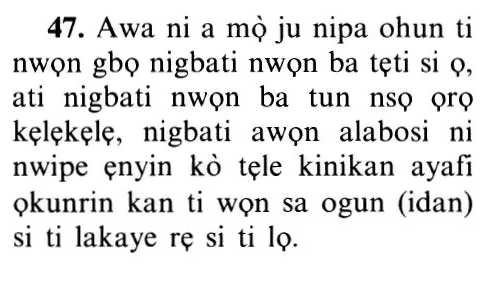17vs47
Select any filter and click on Go! to see results
نَّحْنُ أَعْلَمُ بِمَا يَسْتَمِعُونَ بِهِ إِذْ يَسْتَمِعُونَ إِلَيْكَ وَإِذْ هُمْ نَجْوَى إِذْ يَقُولُ الظَّالِمُونَ إِن تَتَّبِعُونَ إِلاَّ رَجُلاً مَّسْحُوراً
Nahnu aAAlamu bima yastamiAAoona bihi ith yastamiAAoona ilayka waith hum najwa ith yaqoolu alththalimoona in tattabiAAoona illa rajulan mashooran
Index Terms
Click to play
Yoruba Translation

Hausa Translation
Mũ ne Mafi sani game da abin da suke saurãre da shi a lõkacin da suke yin saurãren zuwa gare ka, kuma a lõkacin da suke mãsu gãnãwa a tsakãninsu a lõkacin da azzãlumai suke cħwa, "Bã ku biyar kõwa fãce wani namiji sihirtacce."
Asbabu n-Nuzuul (Occasions of Revelation)
The Secret Counsel of Quraysh after hearing the Qur'an
Allah says;
نَّحْنُ أَعْلَمُ بِمَا يَسْتَمِعُونَ بِهِ إِذْ يَسْتَمِعُونَ إِلَيْكَ وَإِذْ هُمْ نَجْوَى إِذْ يَقُولُ الظَّالِمُونَ إِن تَتَّبِعُونَ إِلاَّ رَجُلاً مَّسْحُورًا ﴿٤٧﴾
We know best of what they listen to, when they listen to you. And when they take secret counsel, then the wrongdoers say: "You follow none but a bewitched man.''
Allah tells His Prophet about what the leaders of Quraysh discussed when they came and listened to him reciting Qur'an in secret, without their people knowing about it.
They said that he was Mashur which according to the better-known view means someone affected by magic (Sihr);
it may also mean a man who has a lung, i.e., a mere human being, as if they were saying that if you follow Muhammad, you will only be following a human being.
This second suggestion does not sound correct, because what they meant here was that he was under the influence of Sihr (magic) which made him see dreams in which he learned these words that he recited.
Some of them said he was a poet, or a soothsayer, or crazy, or a sorcerer.
يخبر تعالى نبيه محمدا بما يتناجى به رؤساء كفار قريش حين جاءوا يستمعون قراءته صلى الله عليه وسلم سرا من قومهم بما قالوا من أنه رجل مسحور من السحر على المشهور أو من السحر وهو الرئة أي إن تتبعون إن اتبعتم محمدا إلا بشرا يأكل كما قال الشاعر : فإن تسألينا فيم نحن فإننا عصافير من هذا الأنام المسحر وقال الراجز : يسحر بالطعام وبالشراب . أي يغذى وقد صوب هذا القول ابن جرير وفيه نظر لأنهم أرادوا هاهنا أنه مسحور له رئي يأتيه بما استمعوه من الكلام الذي يتلوه ومنهم من قال شاعر ومنهم من قال كاهن ومنهم من قال مجنون ومنهم من قال ساحر .
"به" بسببه من الهزء "إذ يستمعون إليك" إلى قراءتك "وإذ هم نجوى" يتناجون بينهم أي يتحدثون "إذ" بدل من إذ قبله "يقول الظالمون" في تناجيهم "إن" ما "مسحورا" مخدوعا مغلوبا على عقله
قيل : الباء زائدة في قوله " به " أي يستمعونه . وكانوا يستمعون من النبي صلى الله عليه وسلم القرآن ثم ينفرون فيقولون : هو ساحر ومسحور ; كما أخبر الله تعالى به عنهم ; قاله قتادة وغيره .
I'raab - grammatical analysis of the Qur'an
«نَحْنُ أَعْلَمُ» مبتدأ وخبر والجملة مستأنفة.
«بِما» ما موصولية ومتعلقان بأعلم.
«يَسْتَمِعُونَ» مضارع مرفوع بثبوت النون والواو فاعل والجملة صلة.
«إِلَيْكَ» متعلقان بيستمعون.
«إِذْ» ظرف زمان متعلق بأعلم.
«يَسْتَمِعُونَ» مضارع مرفوع والواو فاعل والجملة مضاف إليه.
«إِلَيْكَ» متعلقان بيستمعون.
«وَإِذْ هُمْ نَجْوى » إذ ظرف معطوف على ما قبله ومبتدأ وخبر مرفوع بالضمة المقدرة على الألف للتعذر والجملة مضاف إليه.
«إِذْ» ظرف بدل من إذ قبلها.
«يَقُولُ الظَّالِمُونَ» مضارع وفاعله مرفوع بالواو لأنه جمع مذكر سالم والجملة مضاف إليه.
«إِنْ» حرف نفي.
«تَتَّبِعُونَ» مضارع مرفوع بثبوت النون والواو فاعل والجملة مقول القول.
«إِلَّا» أداة حصر.
«رَجُلًا» مفعول به.
«مَسْحُوراً» صفة.
